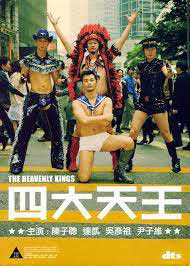

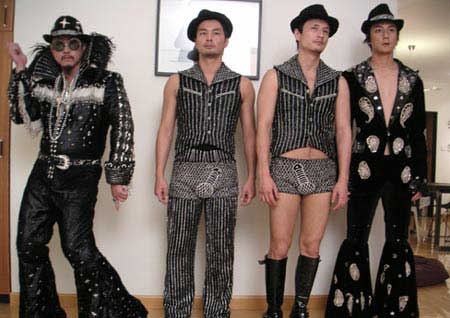
This led Wu to go one step further than
what Lin was considering – why not, he thought, form a boy’s band themselves
and then film the whole process for posterity with a definite eye focused
on the ridiculousness of it all. Wu brought two other friends on board, Terrance
Yin and Conroy Chan, which along with the fact that all of them were not
only a bit long in the tooth for a “boy’s band” but also all foreign born
with weak Cantonese skills all the more absurd. That none of them other than
Yin could actually sing was considered to be of little consequence in the
current music scene. So the four of them announce with all seriousness to
the press that they are forming a band called “Alive”, then get a manager
and try to make a record – to at times very amusing results.
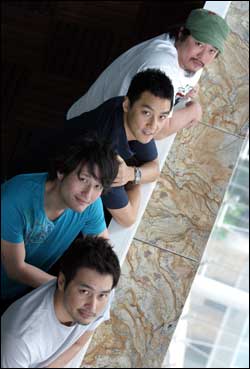
Within this framework of reality, Wu (as
the director of this) interweaves much faux drama of personality clashes
and being packaged for success and it is not always easy to discern what
is real and what is fiction. As a mockumentary, the film doesn’t really break
any new ground and is perhaps too gentle but the fact that it stars a few
well known personalities playing themselves gives it a delicious insider
feel. Of the four only Wu could be considered a “star” (and the other three
refer to him constantly as the handsome one) while the other three actors
have primarily been utilized in secondary roles or in the case of Conroy
he has been lucky enough to marry Josie Ho who is lucky enough to be the
daughter of a wealthy tycoon. Also interspersed within the film are comments
from luminaries such as Jackie Cheung, Karen Mok, Miriam Yeung, Paul Wong
and Nicholas Tse about the music business. Whether they were aware that they
were in on a gigantic gag is not clear as their comments are serious and
give the proceedings an air of unexpected respectability.
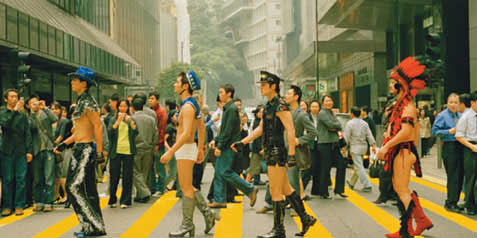
The group goes into the studio to cut a
song and after many many takes (their producer winces in pain at their singing
ability), they have a song and are ready to make the rounds of the record
companies. But none of the companies are particularly interested or they
want to take a huge cut of the profits and after a few months it looks like
the band is going nowhere. Wu then comes up with a marketing strategy that
is brilliant and totally unethical – but as he says so are all the marketing
strategies employed by the record companies. He surreptitiously uploads their
song to the Internet and then calls a journalist to complain that someone
in one of the record companies must have stolen the song and done this. This
phone call that is recorded actually happened and later a press conference
was held that again raged about their song being stolen and their value as
a band being damaged. Because of this blatant and unapologetic manipulation
and mockery of the press, the film was ignored by many papers when it was
released!
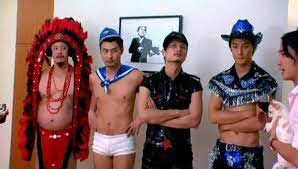
The deception works though and soon this
publicity causes the band to be in demand for concerts for Channel V and
promotions for ads (Wu says they used the money to help finance the film)
and the fact that they have no real talent truly doesn’t matter. Their manager
tells them they need to sharpen up their image by learning how to dance and
to borrow some style and so experts are brought in to teach them both. Adding
even more to the fog between reality and fiction is that the dance choreographer
is actor Tony Ho and the stylist is actor David Lee – but both are identified
with their real names. These segments are the comical highlights of the film
– Ho gets incredibly frustrated with their inability to learn some simple
dance steps and Lee playing gayness to the nth degree has the boys try on
various outfits that bring bad taste to a new plateau.
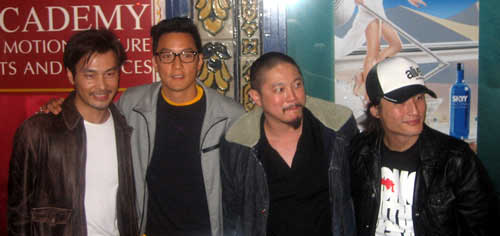
As the band becomes a bit successful frictions between the members threaten to tear the group apart. All four members are given distinct personalities and again one wonders how much of this is real and how much is made up. In an interview Conroy says somewhere between 10-15% is really who they are – somehow I suspect more. – perhaps just exaggerated for drama and humor. Wu is the controlling one who has a hissy fit when Yin forgets the lyrics on stage, Lin keeps quiet and is looking at this as an opportunity to further his film career, Yin is the party boy who is always late due to carousing and willing groupies and Conroy just seems to be a lazy bastard who knows he has it made because of his marriage! In the end though they are all very likable and the fact that they allow themselves to be portrayed as less than perfect makes them even more so. One senses that these would be fun guys to hang out with and that they have the beginnings of their own Hong Kong Rat Pack (alluded to in the film) in the making.
Most surprising to me about the film is that Wu took on the reins of director and did a fine job mixing all the elements of the film from concert footage to anime to interviews to backstage drama. It is also a clever script that he came up with and it will be interesting to see if he continues to shed his “star” image as he does here and occasionally experiment in films such as this. One can only hope so because this is one of the better things he has been in by far and Hong Kong needs all the new inspiration it can get.